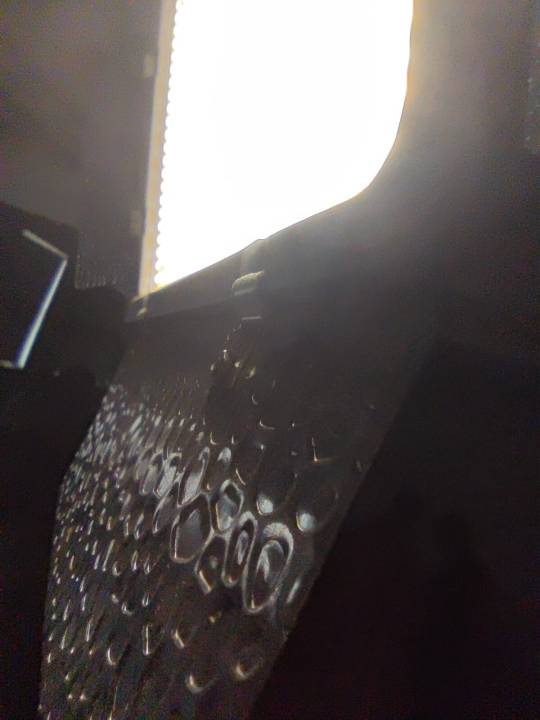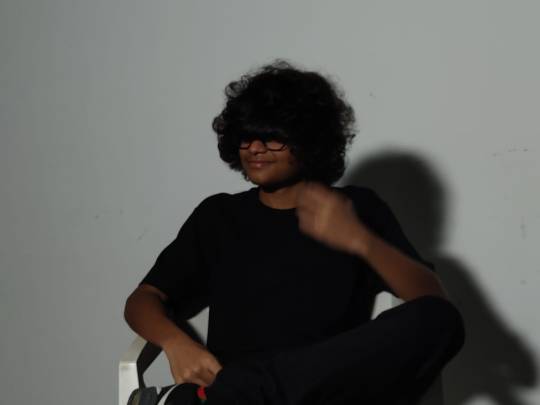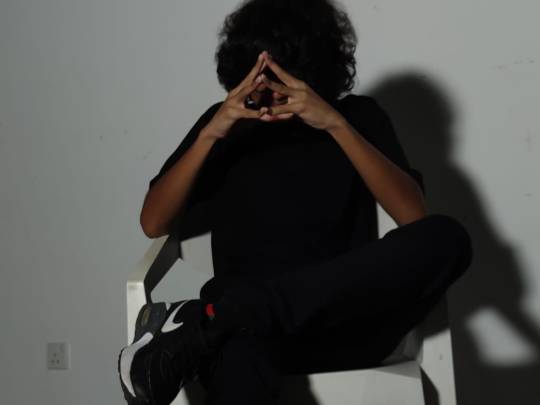Text
Movie Mise-en-scène case analysis
I think MISE-EN-SCène is a very interesting place, which is the difference between pure composition. In a good composition, a picture can reflect a story in itself
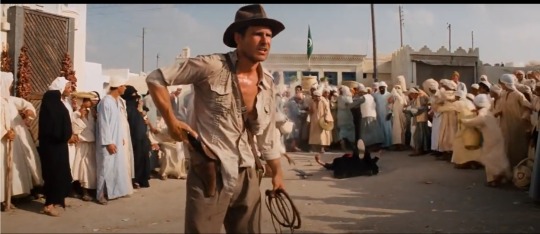
Take a classic lens in Indiana Jones, for example, a good picture can reflect a story
: Where is this person?
He is in the Arab region:
: What did this person do?
He killed someone:
: What do you use?
Use gun:
:Why?
It seems that the man wants to attack him:
: What attack?
Use a knife:
: What about the people around?
Some people are anxious, some people watch the show:
And this lens makes the light and shade relations very well. It is already a good Mise-en-scène.
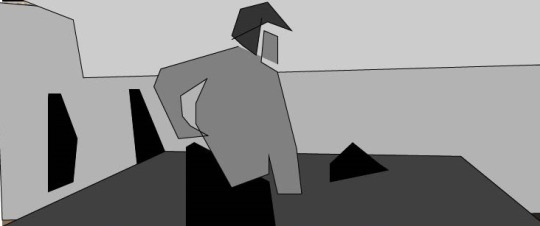
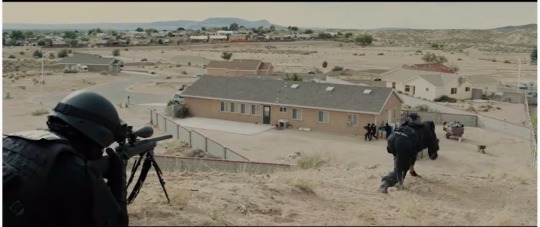
(There are many similar ones)
But I think this can only be said to be a good composition. Although the composition is good. But painting can also be done.
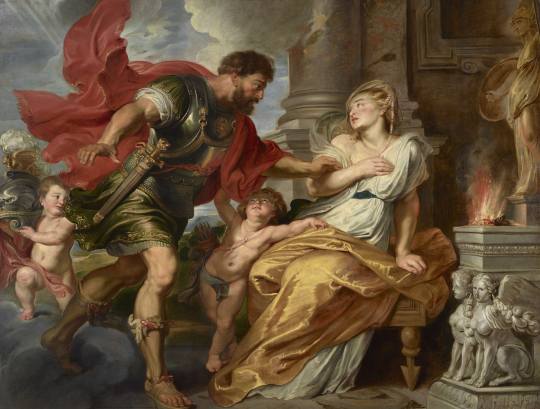
Then why you make movies? I think it is time, music and emotional changes. This is why the movie is a feast of Audio-Visua.
Rashomon
The lens of Woodcutter's walking in the forest, reflects the characters from the first situation, to the second lens to indicate the scene, what is the role of the next shot? What is the effect?
You can follow the lens to intuitively feel the depth of the forest, and the effects of landscape painting in China and Japan are also displayed. The silky switching of multi -perspectives gradually determines the protagonist, and then switched to the character's main perspective. Use the forest lens to present the mood.

Next, gradually switch the perspective to the side and back, and repeatedly alternate with the leaf's light and shade, and the characters shake in front of the camera. This makes the character's trembling and swaying mood.
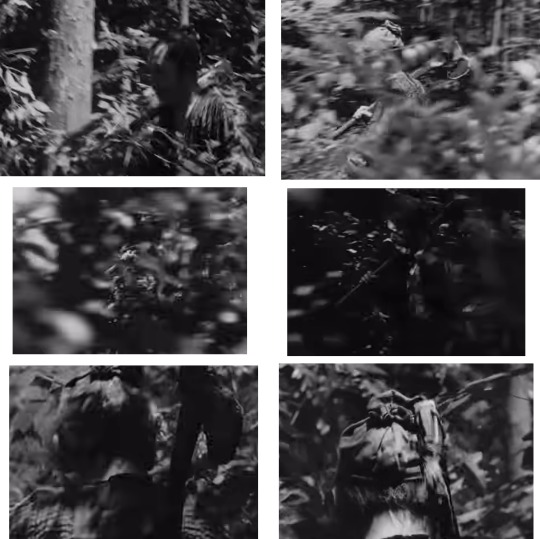
But here I want to make a difference with comics

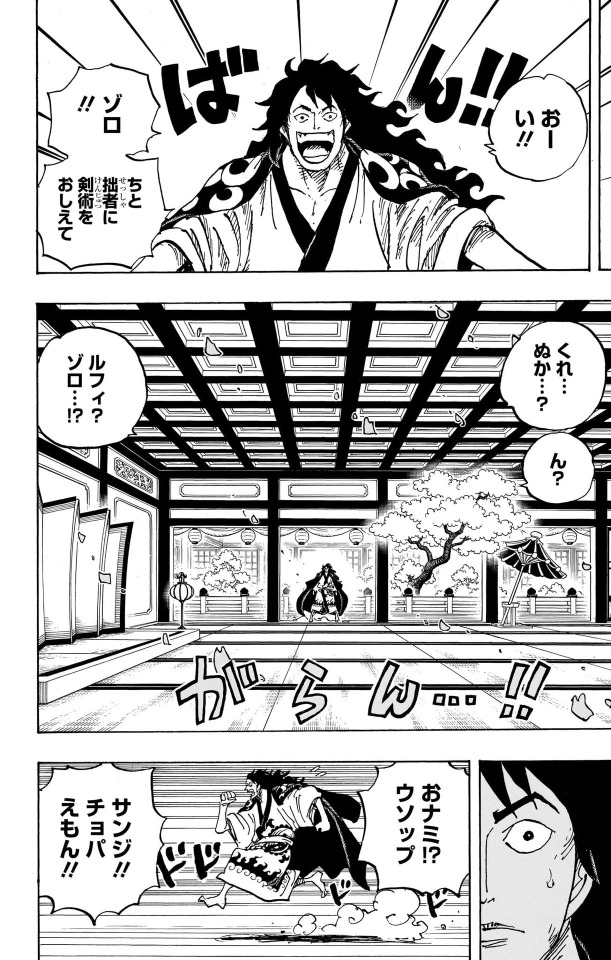

(ONE PIECE,Vol.105, 1056 C. )
In the picture, the characters interact with the scene, through the character's response to the scene (this is actually related to the Kuleshov-Effect), the lonely mood of the character is expressed, and under the repeated call of "general" and "general", the picture gradually cut out the picture out , A empty atmosphere spread. But the character suddenly switches the expression, and the changes in the character's response can show the meaning of the scene. That is, the character suddenly wants to enter a happy environment, but it is just empty. The reaction of the character at this moment has changed again, bringing anxious emotions. Between continuous scene switching, the internal space of the castle building with only one lens was observed, and the switching of the lens perspective expressed the "wrong" feelings. It was not until the character appeared and deepened before entering the next emotional stage.

Just through the screen, the difference between the ratio of the movie and the comics is already a bit vague, but it is just the music change and timeline control of the lens in the movie "Rashomon". With a strong and eager relationship, pounds directly to the next scene.
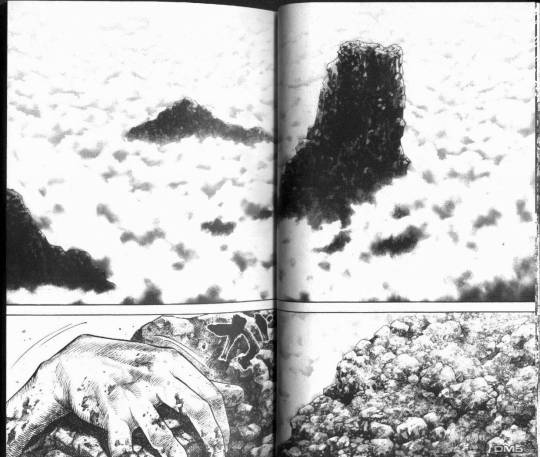
(Vagabond,vol.12, page.34,35)
Lust, Caution,scene 1
Highlight the gloom of the character through the ductive way. But he showed a Republic of China soldier, and two officials by glory.

Determine the point of view by glowing to a character
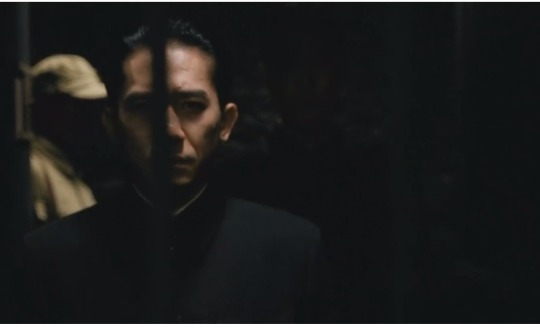
But once again to the supporting role
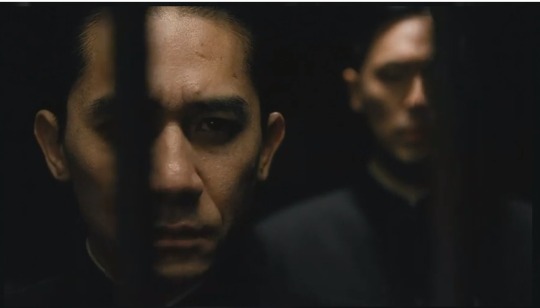
(Go into the cage)
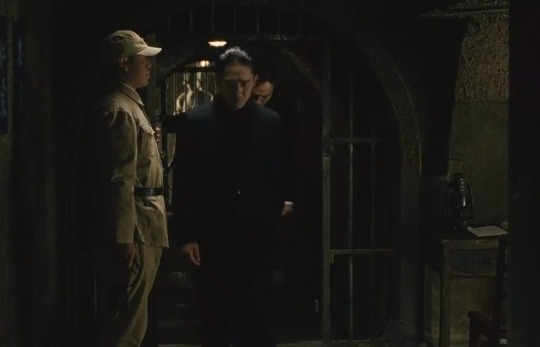
But with the dialogue, the two characters through multiple top lights on the top of the head make the light relationship change
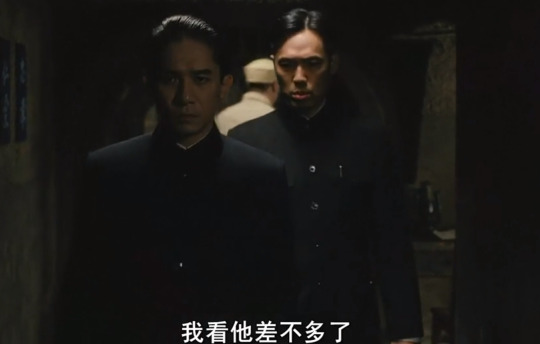
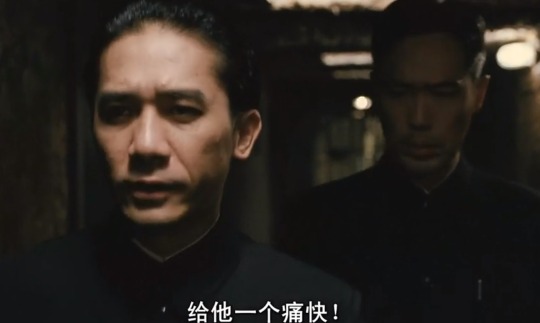
Until the original protagonist was completely backlight, the supporting role became larger and more light.

In fact, this paragraph is the passive role of the main character in front of the Japanese forces.
I feel very powerful in this paragraph. Because perfectly conforms to the meaning of the midstream of the story element (Story, Robert McKee), the characters in the characters are changed. The character relationship in the picture has undergone drastic changes between the characters between the characters on the surface.
Lust, Caution,scene 2
Next, I hope that readers can watch this section of the shot, just understand it through the visual.

This is the scene after Wang Jiazhi left the jewelry shop. Although you can use light and shadow and color, there are dynamic blur, discover the character With a stunned expression, and the character is out of the atmosphere of the public.

This paragraph is through the same scene, but it achieves the effect of the mirror mapping the character's mood. The connection in this scene is very difficult to achieve in painting.
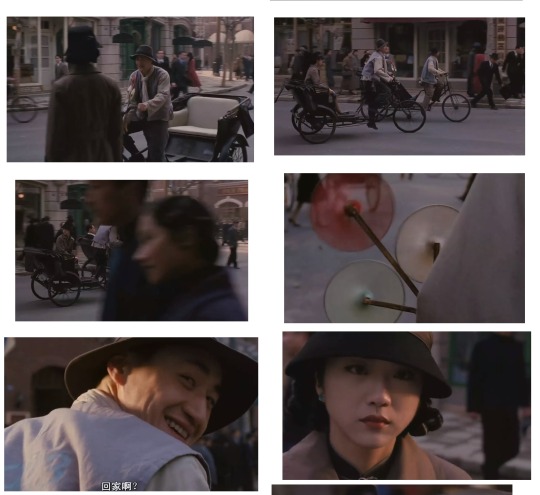
Although this color is dark, it is difficult to say that unhappy scenes. You can only understand this moment through the character's expression, but there is still no effect in the movie.

You can hardly feel the peeling of the characters and the environment when you look at the screenshot of the lens. The time of the intermediate driving lens is relatively long than that of the entire scene. Although you can know that it is "closed road", if you don't look at the final expression of the character, there is no delicate feelings.
And this scene is actually full of spies, and you must observe the action of everyone through each frame of the movie to discover it.
youtube
If you don't watch movies, it is difficult to experience such indifferent melancholy. If you read, you understand why music has a vital role in scenes and shots.
All is understood, and no words are necessary...
0 notes
Text
Task TRY Kuleshov Effect
I think this is through the time, place, and direction of the camera to observe the response of the two objects with mutual changes. Actually this paragraph is a bit like
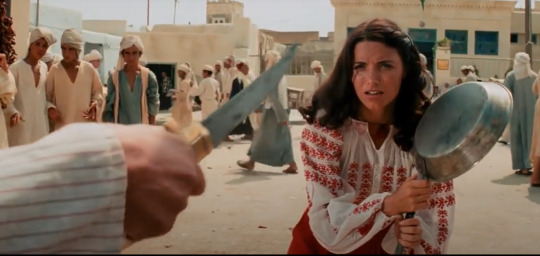
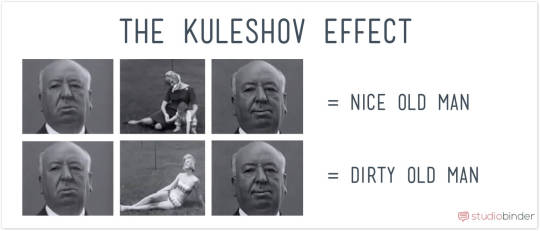

youtube
But the connection between the two lenses is smooth enough, and even affects each other. Then the effect will be outstanding
0 notes
Text
Film Review
The Shining
(Subtle) "The Shining" (softly) If you're someone who's never heard of a film and happens to watch it in the cinema, you probably won't be impressed. After all, in murder plots, movies tend to whisper. But why would a single word unsettle you? What does it mean? Is "The Shining" in the film about the cycle of death, or is it about the maze leading to the unknown, confinement, despair, and madness? When people slaughter Native Americans in the name of justice, when people, driven by desire, find themselves trapped in a maze and resort to cannibalism, when a hotel caretaker murders his family, and ultimately when a mad writer sells his soul for fleeting power and greed, ascending into the maze only to perish in desperate flashes of light.
I find this film to be nothing short of a poem, with its marvelous composition, cleverly arranged eeriness, and psychological implications woven through intricate details. With its flawless screenplay, every scene advances the plot seamlessly, making the lengthy narrative feel remarkably compact. Even the criticized opening scene, ingeniously linked through road layouts and shots of the hotel, focuses on those fleeing, cars with lights on in the daytime, and those stopped, cars involved in accidents; amidst eerie settings, the protagonist journeys toward the hotel of horrors. Swiftly, through several key scenes — a count that can be tallied on two hands — all the keys to the film are presented, leaving the rest to the viewer's interpretation.
Like the arrangement of horror in haiku, even the answers are extended through off-screen implications. How can such a film not provoke thought? How can one not reminisce about the characters? I truly admire the director for effortlessly condensing countless scenes, efforts, and reshoots into this two-and-a-half-hour masterpiece. What mastery it requires! Truly worthy of a maestro.
However, truth be told, I don't consider "The Shining" to be a film that truly encapsulates his efforts, considering it's based on Stephen King's novel. With its abundant conflicts of gender and race, what significance does such content hold for him? Is the entire film crafted merely for those two insignificant and irrelevant pedophilic episodes? Or is it a discourse on conspiracy theories, hinting at the Apollo moon landing hoax? Is it the protagonist's hysterical justifications expressing his conflicted desires to admit and deny? Or is it for the vindication of a Beatle?
Yet amidst all these details, the most evident implication seems to be reincarnation, akin to being trapped in a maze where one endlessly turns corners but still moves forward. Either tempted by desire and driven mad in solitude, or gradually retreating step by step, leaving the maze, escaping the labyrinth of the beast Daros. The beast's hypocritical humility serves to sell your soul in madness, dancing for insanity, one should beware of losing oneself. Do not be deceived by the facade embellished by authority, for within the strong lies the stronger, within the weak lies the weaker. Though a domineering husband may oppress his gentle wife, the wife is the reliance of the helpless child, while the husband is powerless before his superior. Clearly branded as a societal failure, the protagonist, amidst the hotel's meticulously crafted compositions, dons a shining crown symbolized by a chandelier, blinded by the power within the crown, he ventures into the labyrinth of authority. Able to surveil his family freely within the hotel, akin to overseeing the maze. Hence, when his wife attempts to flee the hotel, Jack defends it as their abode, demanding, threatening them to stay. But where there's no perpetual weak or absolute strong, Jack loses his way in the labyrinth.
The office scene resembles a voyage of the soul in an office, although Ullman, in his neutral manner, outlines the risks of Jack's impending choices, Jack, unswayed by Bill's guidance, insists on meeting Satan, whether lured by the devil or the demon within. Yet, he is blatantly deceived within the hotel. Initially the one his wife cares for the most, due to the hotel's machinations, she abandons him, plummeting him into despair. Yet he willingly descends into hell, "selling his soul for a drink" (a line from the movie), then signing a contract amidst the crimson toilet, preparing to dispose of his family, relishing in power. It's rather intriguing, as Carl Jung's concept of the unconscious speaks of the hidden evil within human nature. This suggests that those who consort with demons are the demons' cohorts.
However, what I find most intriguing is whether the hotel itself qualifies as a character. If something serves only one function, one purpose, an unchanging meaning, then it should be deemed an object; but if it can change, act, think, possess character and will, then where lies the distinction from a character? Are the two little girls, the woman in the bathroom, the crowd in the hotel ballroom, and the hotel staff not part of the hotel? If the protagonist Jack is part of the hotel, could the hotel not be an extension of him? Seeing the two paintings on either side of the bloodbath scene, the flying bird from "Afternoon in December," the hunter from "Hunting Camp," wouldn't they symbolize not only Jack but also the hotel?
There are many more details in this film that I cannot list all at once. However, regarding the theme of reincarnation mentioned earlier, it doesn't only manifest in the protagonist but also in society. Society squeezes Jack into failure, causing him to seek solace from his family. But from a perspective of racial discrimination, from the recurrent massacres of Native Americans to Jack's final decision with the hotel to avoid Black intervention, society seems to also be squeezing the hotel chef. Could it be that the ability of the hotel chef, the chef's grandmother, and Danny to have the shining is due to their status as oppressed individuals, traversing through women, ethnic minorities, and children, three vulnerable groups? Perhaps the entire film is about the cycle of power dynamics? Who knows? Truth be told, the film is formidable, truly a masterful horror piece, but as for its depth, I haven't really pondered much.
4 notes
·
View notes
Text
The Truman Show
In the movie
After the hypocritical scene of the world discovered the world, the car mirror reflected the character's behavior, and the same monitoring
Use a mirror to reflect the characters on the bus instead of the character perspective to make a conversation
In front of Truman, in front of life was a play, wearing yellow clothes, he was out of the public, and it was different from the public.
0 notes
